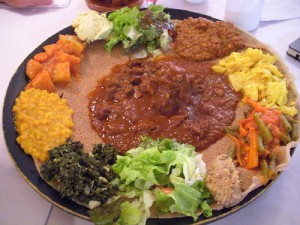Informant RE is a sophomore in high school from San Jose, California, whose family is originally from Ethiopia. There is a strong Ethiopian diasporic community in San Jose, where much of its traditions live on.
Text:
“On graduation parties Ethiopian families are invited by the graduate’s parents to a graduation party, and the parents have to schedule with other parents who have children who are graduating at the same time because they want the parties to be on different days. When they have their set day, they rent out a banquet hall and prepare traditional dishes to serve, but some people also just order it. When people come, you’re supposed to greet them as they come, they give you gifts, then everyone lines up to get food. After the eating, we dance, and we do a lot of different cultural dances. After the dances there are speeches with friends and family, and after the speeches there is more dancing and cake cutting.”
Context:
High school graduation is an important liminal period in numerous cultures marking the transition period from school into the workforce. In the United States, high school graduation is traditionally celebrated with an elaborate ceremony hosted by the school in which students wear special garments and walk across a stage to reflect their passage into a new period.
Analysis:
The Ethiopian-American community takes the graduation ceremony a step further with the more elaborate and highly formalized graduation party. As informant RE alluded to, despite having no official text, the folk celebration of the graduation party is solidified into a specific format, from the choice of location — either a banquet hall or a home — to the itinerary — traditional foods, then dancing, then speeches, then dancing again. The Ethiopian-American graduation party is a collective celebration which not only marks the transition of the graduate, but celebrates the shared culture and community that helped the graduate along the way.

